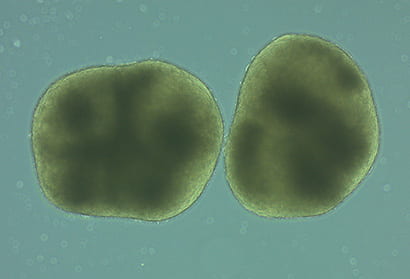UCSC engineers and genomics experts are partnering with UCSF neuroscientists to develop new technology for studying human brain evolution and development
| February 27, 2019 | By Tim Stephens |
The UC Santa Cruz Genomics Institute, in collaboration with neuroscience faculty at UC San Francisco, is launching an ambitious new project to learn how the human brain evolved and how its neural circuitry develops.
The project, funded by Schmidt Futures, involves applying modern artificial intelligence (AI) approaches to understanding and emulating the architecture of the human brain. A key part of the project is to advance the technology for growing and studying three-dimensional models of brain tissue, called cerebral organoids, in the laboratory.
Starting with human pluripotent stem cells, researchers can now grow cerebral organoids that are like small patches of cerebral cortex or other brain regions. Improving the technology for growing cerebral organoids will make this important research tool more powerful and more widely available, said David Haussler, professor of biomolecular engineering and scientific director of the UC Santa Cruz Genomics Institute at the Baskin School of Engineering.
“We want to scale up this technology to make larger numbers of more realistic models of the human cortex,” Haussler said. “It will take a huge amount of work to develop this technology, but the questions we can ask are incredibly exciting, such as: What were the genetic changes in evolution that gave us our bigger and differently-wired brains? In other words, how did we become human?”
[ Read more ]
